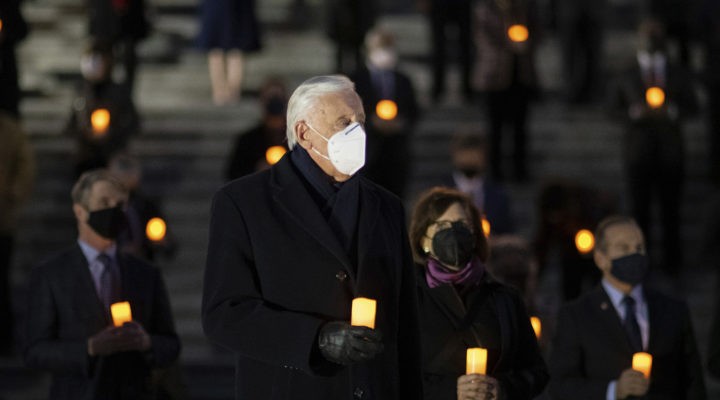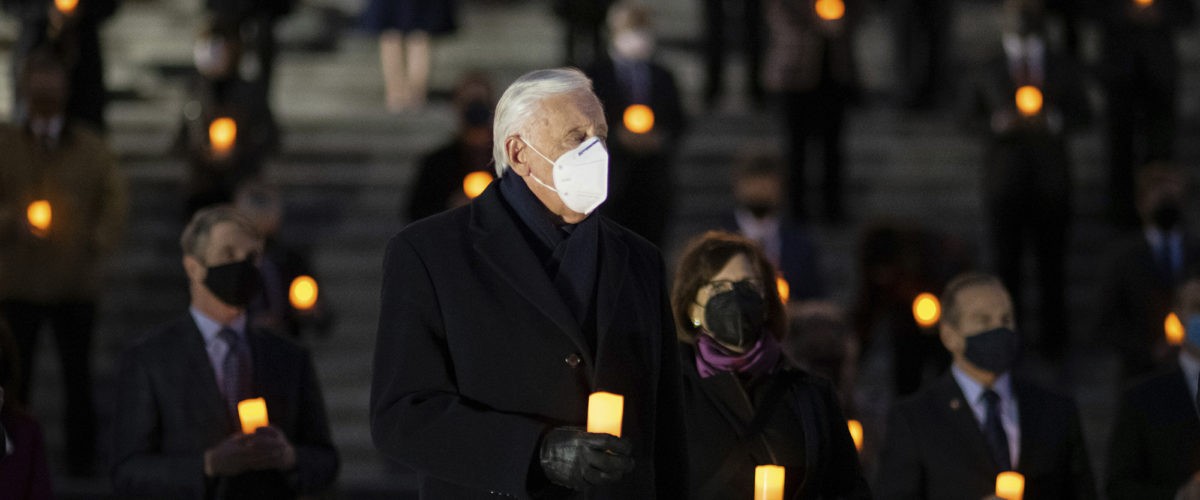Outside my window, green shoots peek from the ground that was frozen just a couple of weeks ago. Warm air greets me like an old friend, and tree buds are biding their time until they explode open in pops of color and start the party.
The earth and our bodies are awakening from their winter slumber as new energy and life begin to sprout. Every year, spring ushers in a sense of fresh possibility and reminds us that light really is at the end of the tunnel of darkness.
This year feels different.

Christy Edwards
I don’t know about you, but in one hand I hold a sense of gratitude and excitement at the shift in season — and in the other hand, I feel anxious and irritable. I’m not able to focus for the first time in months, am frustrated with things that usually don’t bother me, and I keep wanting to escape. I feel restless in both my body and my spirit. There’s a reason for that.
As we confront the one-year anniversary of when our worlds individually and collectively turned upside down as COVID-19 became personal, it’s helpful to keep in mind what psychologists often refer to as “the anniversary effect,” or the “anniversary reaction.”
Deboray Seranis defines this phenomenon as “a unique set of unsettling feelings, thoughts or memories that occur on the anniversary of a significant experience.” The anniversary effect can persist from days to weeks and stems from unresolved grief associated with the past experience. It is common during this time frame for the individual or community to experience anxiety, fear, depression and anger. You may find yourself in tears, seemingly out of nowhere.
The anniversary effect is experienced by individuals who have walked through trauma or death. As a nation, we annually revisit the fear and grief we experienced on Sept. 11, 2001. And, now, for the first time in my memory, we will commemorate an event that has affected each of us on a global scale — the COVID-19 pandemic.
“The anniversary effect is experienced by individuals who have walked through trauma or death.”
Those early days one year ago were fraught with fear, uncertainty, anxiety and scarcity. I have vivid memories of empty aisles in stores, the silence that permeated a normally bustling city, news stories of shutdowns all over the map, and the understanding that a virus was out of our control, threatening our very lives.
This week, as we mark the anniversary of COVID-19 moving into our neighborhoods, we can feel, smell and remember those first days. We also can flip the calendar pages and know the devastation and destruction that we would experience the next 365 days.
More than 500,000 Americans have died from this disease. More than a number, these are mothers, husbands, children, grandparents, friends. For those who have been acutely touched by these deaths, the anniversary effect may be even more powerful. Others are living with lingering physical side effects of COVID-19, lamenting lost jobs and income, grieving a year of missed family gatherings, experiencing pain watching their child’s mental health shift as a result of isolation and stress. All of us miss much of what we refer to as “normal.”
The hopeful news of the anniversary effect is that it provides us an opportunity for emotional healing if we are intentional about continuing our work through the unresolved grief we are carrying with us. No magic wand exists that can wave us straight to healing. Like the children’s song, “We’re going on a bear hunt, … we came across a river, … we can’t go over it, we can’t go under it, we have to go through it.” That’s how grief works. To heal the wound, we have to revisit the pain and process the emotions.
And, believe me, none of us want to do this. It’s much easier to eat the third cookie, buy more things we don’t need, find the last show on Netflix we haven’t binged and press play.
“No magic wand exists that can wave us straight to healing.”
The thing is that doing these numbing activities (and there’s no shame in these — I do them too) without ever facing the pain leads to the emotions coming out sideways. It all leaks out somewhere. Intentional processing gives us more control. It also requires effort.
But what if I told you that perhaps the most effective way to process through the grief you are carrying from the COVID-19 anniversary is through story?
Whether you are cognizant of it or not, your body and your spirit know that this spring is an anniversary and that there is grief to be processed. Memories will begin to surface, and one of the best things you can do is to find a space to share those anniversary stories.
In his book Listening and Caring Skills, John Savage writes: “This is what anniversary stories try to do. They rehearse the event at the same time of year and work through more of the emotions.” When you tell the story of how you felt last year as you read the news of Disney shutting down, Broadway going dark, schools moving to virtual learning, and cities locking down, you will give voice to more of your grief and lessen the pain of that experience.
Savage goes on to write: “These occasions will act like a low-pressure weather system, which sucks in all other similar thematic unfinished griefs. That is why these events are so emotionally powerful. You are not dealing just with the central event but with all those other times you avoided the grieving process.”
Over the next few weeks, as memories and stories of the onset of the pandemic surface, you may also experience a resurgence of other trauma that seems to you unrelated to COVID-19. This is normal and provides another opportunity for you to continue the difficult work of mourning those past experiences.
This can be done using a journal, but it is most effective when processed with another person, whether that be a friend, a family member or a therapist. When we put words to pain, the pain begins to lose some of its power. Likewise, when we actively listen to someone as they share their story, our empathy deepens and we build a connection. And if there’s anything we’ve learned this past year, it is that we do not thrive in isolation. We are created for community — a story-telling, listening, caring community.
Every year, spring will trigger memories of the first weeks of this pandemic. I will share my stories and listen to others share theirs and, every year, the burden of the pain of that time will grow just a little bit lighter. May the same be true for you.
Christy Edwards is a board-certified pediatric hospital chaplain who lives in Liberty, Mo., with her husband, Jason, and their three children.


